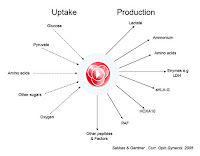METABOLOMICS: Check - up for embryos

The 'key' to the selection of the healthiest embryos in order to increase the possibility of pregnancy is the method of Metabolomics applied now by MITERA Assisted Reproduction Unit, Athens, Greece.
It is a non invasive technique of just two-minute duration; identifying the differences in the metabolism of viable against non viable embryos and selecting the best embryos for embryo transfer after IVF (in vitro fertilization).
As stated by the director of MITERA Assisted Reproduction Unit, embryologist Giles Palmer 'With Metabolomics, we measure the metabolic profile and can predict with confidence whether an embryo will result in pregnancy or not .
Explaining the procedure, Mr. Palmer stresses that 'through the investigation of small-molecule metabolites produced by embryos during the cellular processes, we can take a small 'snapshot' of the embryo’s physiology that portrays its general health. We, therefore, select the healthier embryos for embryo transfer after IVF, thus fast, easily and effectively increasing the chance of pregnancy.
Until recently, the only way to assess an embryo’s viability has been to study the morphology using the microscope. Moreover, due to restrictions of the legislative in many European countries regarding the number of oocytes that can be fertilized or the number of embryos that can be transferred, it is legal only to select very few or even just one embryo for embryo transfer, hence the need to select the most appropriate embryo.
'The biggest risk in IVF is multiple gestations', says Mr. Palmer. 'Now with the Metabolomics method, we are able to increase the success rate of implanting a viable embryo, making sure that fewer embryos will be transferred to avoid twin or triplet pregnancies. Our objective is to assist sub-fertile couples to have a healthy pregnancy and a healthy child'.
Metabolomics is one of the many groups of emerging research in the "omics" family-
Genomics - the study of gene regulation. Transciptomics -the study of gene expresion, and proteinomics- the study of protein production.
These techniques for many years have been applied to others areas of science, the food and pharmaceutical industries but now the attention has been turned towards assisted reproduction technology.
Coming soon 2020 Vision: assisted reproduction in the year 2020-
IVF experts give their prediction for IVF treatment ten years from now !!
http://www.kosmogonia.gr/
metabolomics video click here
Publications:
2010:
Aydiner F; Yetkin C E; Seli E
Perspectives on emerging biomarkers for non-invasive assessment of embryo viability in assisted reproduction.
Current molecular medicine 2010;10(2):206-15.
2008:
Seli Emre; Botros Lucy; Sakkas Denny; Burns David H
Noninvasive metabolomic profiling of embryo culture media using proton nuclear magnetic resonance correlates with reproductive potential of embryos in women undergoing in vitro fertilization.
Fertility and sterility 2008;90(6):2183-9.
2007:
Seli Emre; Sakkas Denny; Scott Richard; Kwok Shing C; Rosendahl Scott M; Burns David H
Noninvasive metabolomic profiling of embryo culture media using Raman and near-infrared spectroscopy correlates with reproductive potential of embryos in women undergoing in vitro fertilization.
Fertility and sterility 2007;88(5):1350-7.
2005:
Sakkas Denny; Gardner David K
Noninvasive methods to assess embryo quality.
Current opinion in obstetrics & gynecology 2005;17(3):283-8.


Comments